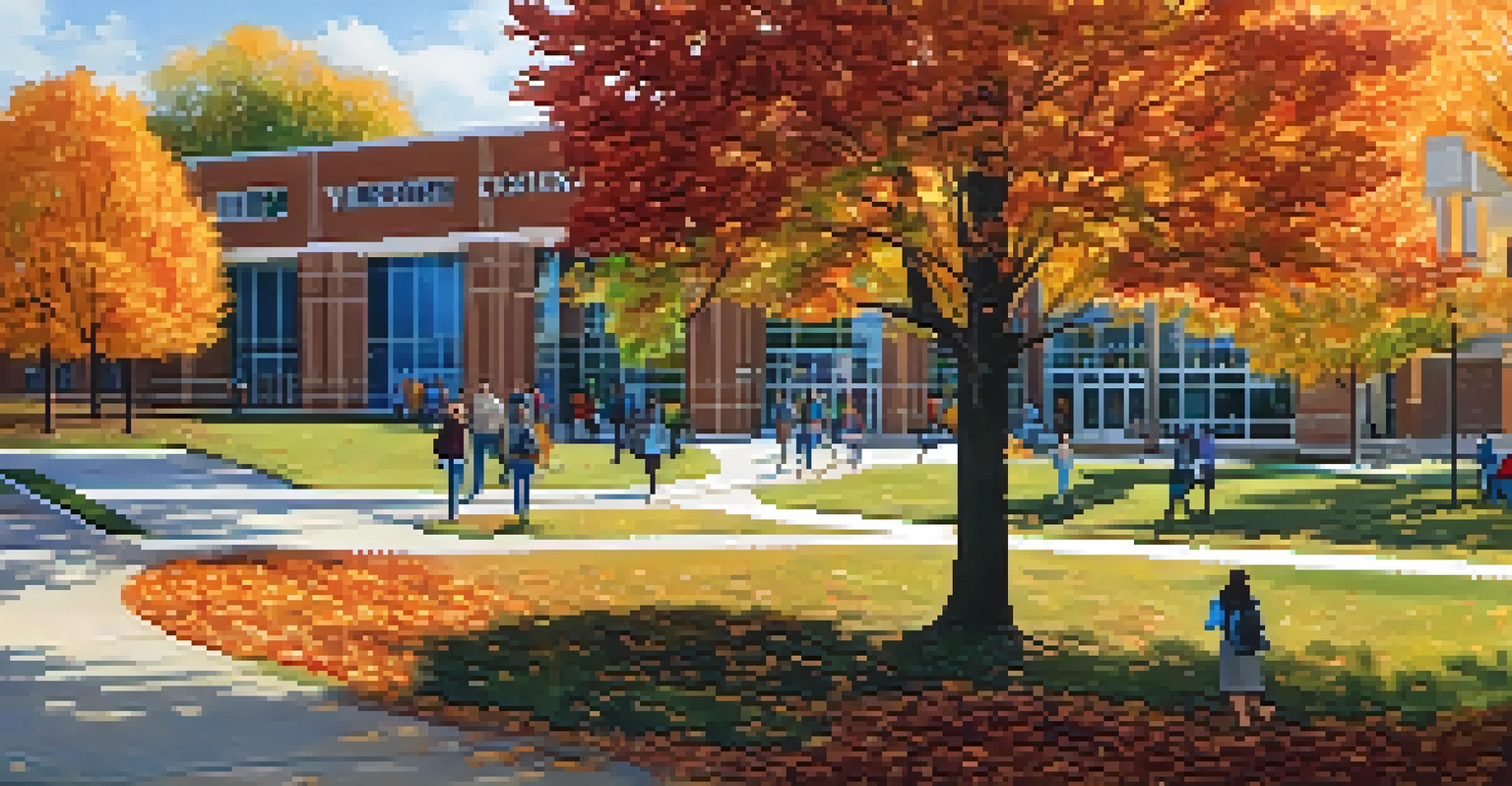The Role of Community Colleges in Illinois Education System

Introduction to Illinois Community Colleges
Community colleges in Illinois play a pivotal role in the education landscape, serving as accessible gateways for higher education. They offer diverse programs that cater to the needs of local communities, from vocational training to transfer programs for four-year institutions. With over 40 community colleges across the state, they contribute significantly to workforce development and lifelong learning.
Education is the most powerful weapon which you can use to change the world.
These institutions are designed to meet students where they are, providing flexible schedules and affordable tuition. This accessibility is crucial for many individuals who may not have the resources to attend a traditional university. By offering a range of courses, community colleges help bridge the educational gap for underrepresented populations.
In essence, community colleges serve as a vital link in the educational chain, empowering students to pursue their academic and career goals. Their role is not just about education; it's about creating opportunities and fostering a culture of learning that extends beyond the classroom.
Economic Impact of Community Colleges
Community colleges contribute significantly to Illinois' economy by preparing a skilled workforce. They offer a variety of programs tailored to meet the demands of local industries, ensuring that graduates are job-ready. This focus on workforce alignment not only benefits students but also strengthens the economy by filling critical skill gaps.

Moreover, investing in community colleges yields a high return for the state. Research shows that each dollar spent on community college education leads to increased earnings for graduates, which translates into higher tax revenues for the state. This economic boost is essential for sustaining community growth and development.
Community Colleges Drive Economic Growth
Illinois community colleges prepare a skilled workforce, directly contributing to local economies and filling critical skill gaps.
In addition to individual benefits, community colleges stimulate local economies by attracting students from outside the area and supporting local businesses. Whether through purchasing supplies or utilizing local services, these institutions have a ripple effect that positively influences the broader community.
Diversity and Inclusion in Community Colleges
One of the standout features of community colleges in Illinois is their commitment to diversity and inclusion. These institutions welcome students from various backgrounds, including those who might face barriers in accessing higher education. This diversity enriches the learning environment and fosters a sense of belonging among students.
The future belongs to those who believe in the beauty of their dreams.
Programs and support services aimed at underrepresented groups further enhance this commitment. From ESL (English as a Second Language) courses to mentorship programs, community colleges provide vital resources that help all students succeed. This inclusive approach not only promotes equity but also prepares students for a diverse workforce.
By embracing diversity, Illinois community colleges cultivate a rich tapestry of perspectives that ultimately benefits everyone. Students learn from one another's experiences, preparing them to thrive in an increasingly interconnected world.
Transfer Pathways to Four-Year Institutions
Community colleges serve as crucial stepping stones for students aiming to transfer to four-year universities. Many students begin their higher education journey at a community college to save on costs while earning credits that can transfer later. This pathway offers a more affordable option, making higher education attainable for many.
Partnerships between community colleges and universities facilitate smooth transitions for transferring students. These agreements outline which courses will transfer, ensuring that students remain on track towards their bachelor's degree. Such collaborations are essential in reducing the complexity often associated with transferring credits.
Commitment to Diversity and Inclusion
These institutions foster a rich learning environment by welcoming students from diverse backgrounds and providing vital support services.
Moreover, community colleges provide academic advising and support to help students navigate their transfer options. With dedicated resources, students can make informed decisions about their future, ultimately leading to successful transfers and degree completion.
Vocational and Technical Training Opportunities
In addition to traditional academic programs, Illinois community colleges offer a wealth of vocational and technical training opportunities. These programs are designed to equip students with the practical skills needed for high-demand careers in fields such as healthcare, information technology, and manufacturing. This hands-on training is invaluable in today’s job market.
Community colleges often collaborate with local employers to ensure that their training programs align with industry needs. This partnership not only helps students secure employment after graduation but also supports local businesses seeking skilled workers. Such alignment is crucial for economic development in the region.
By focusing on vocational education, community colleges help students gain employment quickly, often with short-term programs or certifications. This approach allows individuals to enter the workforce sooner while also providing pathways for further education and advancement.
Lifelong Learning and Continuing Education
Community colleges in Illinois also play a significant role in promoting lifelong learning through continuing education programs. These offerings cater to adults looking to enhance their skills, change careers, or pursue personal interests. From professional development courses to personal enrichment classes, there’s something for everyone.
These programs are especially beneficial in a rapidly changing job market, where keeping skills up-to-date is essential. Community colleges provide flexible options, such as evening and online courses, making it easier for busy adults to participate. This adaptability ensures that education remains accessible, regardless of life circumstances.
Pathways to Higher Education Success
Community colleges serve as affordable stepping stones for students aiming to transfer to four-year universities, facilitating smoother transitions.
Moreover, lifelong learning fosters a culture of curiosity and growth within the community. When individuals continue to learn, they not only improve their own lives but contribute positively to society as well, creating a more informed and engaged citizenry.
Challenges and Opportunities Ahead
Despite their many benefits, community colleges in Illinois face certain challenges. Funding constraints, competition from online education, and the ongoing need to adapt to workforce demands can pose significant hurdles. Addressing these challenges requires innovative solutions and strong community support.
However, these challenges also present opportunities for growth and reimagining the role of community colleges. By embracing technology and expanding online offerings, these institutions can attract a wider audience and meet the needs of a diverse student population. Additionally, strengthening partnerships with local businesses can enhance program relevance and effectiveness.

Ultimately, overcoming these challenges will require a collaborative approach involving educators, policymakers, and the community at large. Together, they can ensure that Illinois community colleges continue to thrive and serve as vital resources for education and workforce development.